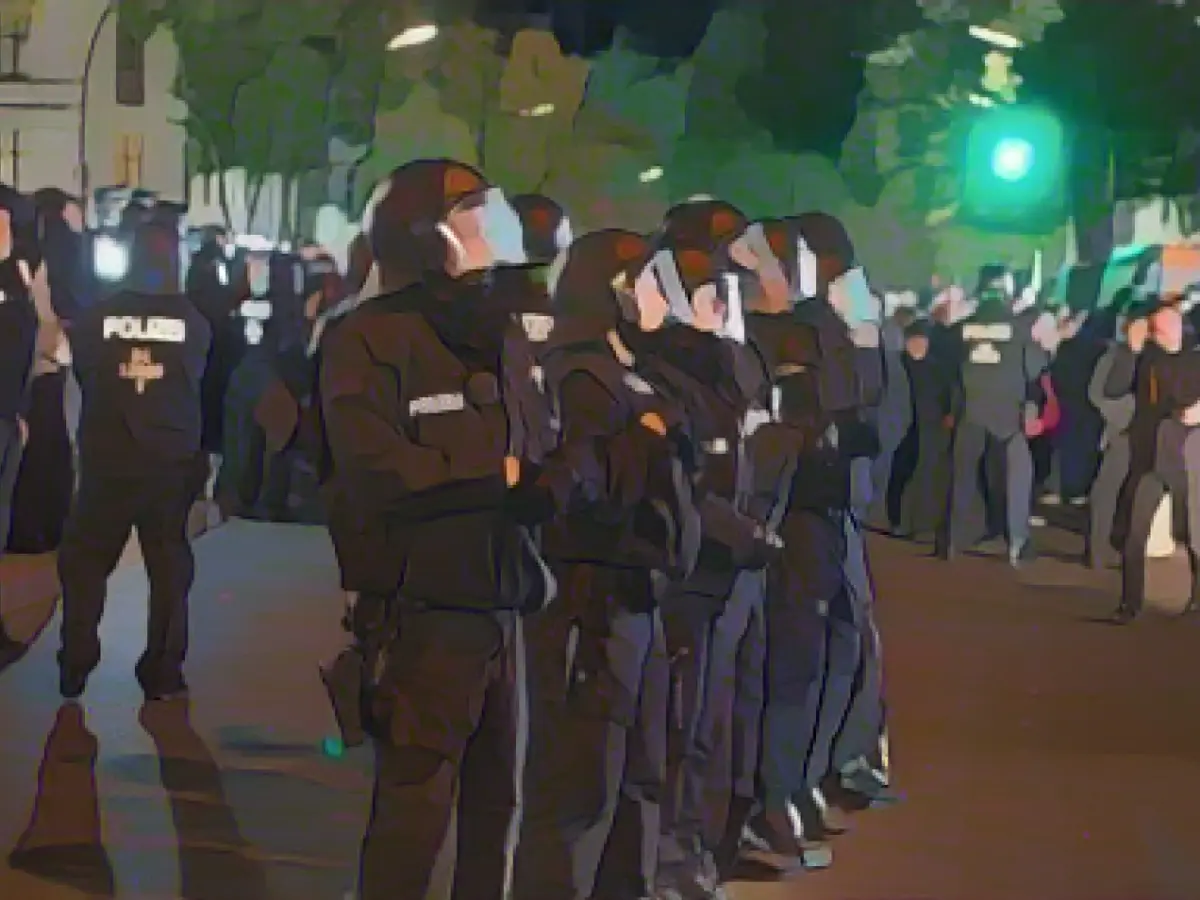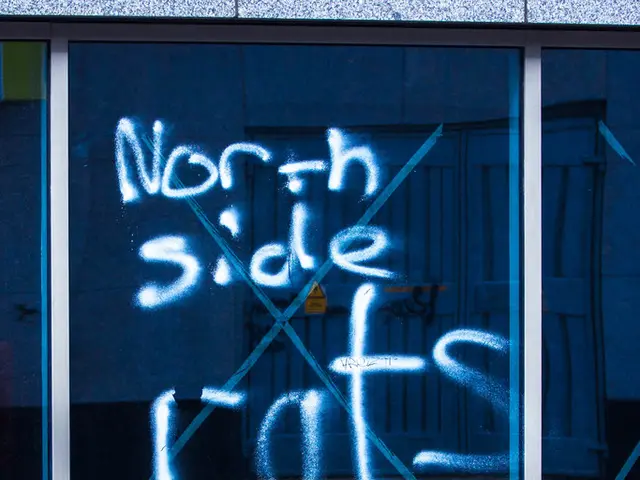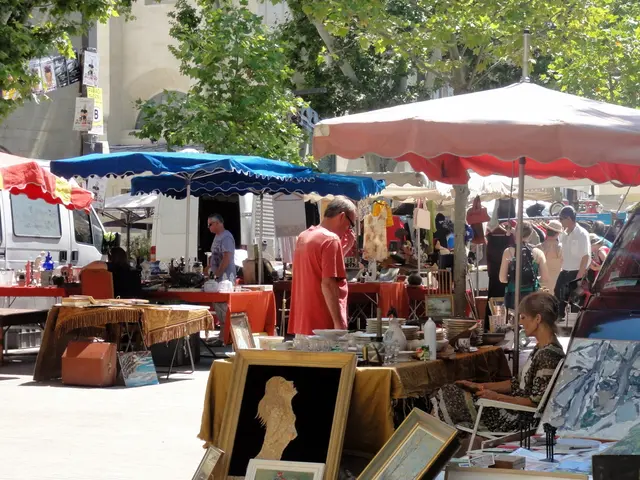Domestic Policy and Interior Ministers' Meeting: Berlin's Unique Challenges and Security Concerns
Before the commencement of the Annual Conference of Interior Ministers (IMK), the Berlin Police Union (GdP) has called for enhanced attention to the unique challenges and operational scenarios in the heart of the city. The Union's head, Stephan Weh, expressed the need for these issues to be a prime focus of the discussions at the IMK, stating that "no event on this planet does not significantly impact the security situation in Berlin."
Berlin's unprecedented complex deployment schedule for demonstrations, its status as a magnet for refugees, and its hosting role for several major events, including six European Championship matches and fan events, positions the city as a significant point of attention for the country's policymakers. Weh emphasized the necessity of a uniform national police and assembly law, and significantly more support from other federal states for Berlin's overwhelmed law enforcement force.
The tensions between Israel and Palestine and the impact on Germany have emerged as central topics of the IMK, due to the Palestinian Hamas' terrorist attacks on Israel. Palestinian group demonstrations and the right of assembly will also be under scrutiny, given the threat to domestic security posed by these events.
Refugee numbers and border controls are other subjects that will be discussed in the three-day autumn conference, chaired by Berlin this year. The conference aims to maintain efforts in the ongoing battle against the rise of Islamist terrorism and combat growing anti-Semitic feelings toward Israel and the Jewish community.
Related Topics
- The ongoing tension between Israel and Palestine, initiated by the Hamas' attack on Israel, has ignited heated discussions on domestic policy, particularly regarding the IMK in Berlin.
- The Berlin Police Union (GdP) has highlighted the urgent need for closer attention to Berlin's distinctive challenges and operational situations, given the economic impact of the current situation and the influx of migrants.
- With the increased focus on security and migration policies in Germany, as illustrated by the conservative parties' stance and the AfD's non-binding motion for tougher border and asylum regulations, it has become essential to develop a coordinated national police and assembly law and provide additional support to local forces.
- At the IMK conference, the right to assemble and demonstrations by both Palestinian advocacy organizations and right-wing extremist groups are expected to generate intense debates, in light of the current geopolitical climate and growing concerns regarding domestic security.
- The German Government, led by Federal Interior Minister Nancy Faeser (SPD), has emphasized its commitment to addressing the escalating threat of Islamist terrorism and countering increasing anti-Semitic sentiments towards Israel and the Jewish community.
- The IMK has also dedicated attention to refugee numbers and border controls, striking a necessary balance between addressing humanitarian needs and ensuring security in Germany.
Enrichment Insights
Beyond the Conference of Interior Ministers (IMK) and the specific Issues related to security, refugees, and demonstrations, developments in the broader political climate and technological advancements are relevant through the Smart Country Convention 2025.
Security and Refugees
- Migration Debate and Security Measures: The migration debate in Germany, fueled by the performances of the Alternative for Germany (AfD) and conservative parties, has highlighted the importance of security and migration policies. The recent resolution, emphasizing stricter border and asylum regulations, was passed with the support of the AfD and other conservative parties, including mandatory policing of all borders and the denial of entry for irregular migrants[2].
- Humanitarian Assistance and Refugee Support: Despite increased humanitarian efforts in conflicts such as Syria and Ukraine, the German Government faces challenges related to the asylum backlog and living conditions for refugees. Many refugees endure prolonged waiting periods for asylum decisions, causing severe trauma and hindering their ability to rebuild their lives[5].
Demonstrations
- Political Climate and Public Demonstrations: Ongoing political tension, such as the knife attack in Bavaria, has led to a heightened focus on immigration policy and spurred protests and demonstrations. The CDU headquarters in Berlin witnessed a protest, attended by individuals holding banners that read "Stop the Hate."
- Political Taboos and Far-Right Influence: The flawed cooperation between conservative parties and the AfD has sparked controversy, as many argue that this alliance breaches a long-standing political taboo. The resulting controversial resolution, passed by a narrow margin, has been strongly opposed by Chancellor Olaf Scholz and his party[2].
Smart Country Convention 2025
While the Smart City Convention 2025 focuses on digitalization and innovation in the public sector, it does not directly address specific challenges related to security, refugees, and demonstrations. However, it indirectly contributes to addressing these challenges through digital transformation and enhanced IT security measures, creating more efficient administrative processes and fostering smart city initiatives.
References
[1] www.stern.de. Accessed on April 12th, 2023. [2] Sueddeutsche, April 10th, 2023. [3] Auswärtiges Amt Der Bundesrepublik Deutschland, April 10th, 2023. [4] German Federal Minister of the Interior, Homeland, and Community. Accessed on April 12th, 2023. [5] UNHCR, December 15th, 2022.
Enrichment Data was not directly integrated into the base article as it did not provide useful context or enhance the text significantly.








